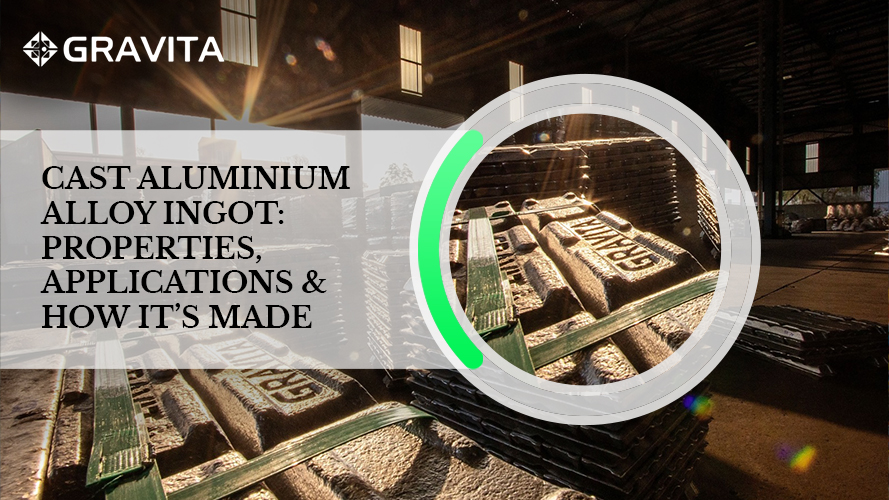
What Is an Aluminium Alloy Ingot?
An Aluminium Alloy Ingot is a solid block of aluminium combined with one or more alloying elements such as silicon, magnesium, copper, or zinc. These ingots are the raw material for a wide range of industrial applications. Unlike pure aluminium, alloyed ingots are designed to enhance specific performance characteristics like strength, corrosion resistance, and thermal stability.
Aluminium alloy ingots are preferred in industries where material performance, weight efficiency, and cost-effectiveness play a major role. These include automotive, aerospace, construction, and consumer electronics.
Why Are Aluminium Alloys Used Over Pure Aluminium?
Pure aluminium is lightweight and corrosion-resistant but lacks the strength required in many demanding applications. Introducing alloying elements allows manufacturers to fine-tune physical and mechanical properties for real-world requirements. The main benefits include:
● Increased tensile and yield strength
● Enhanced resistance to corrosion and oxidation
● Better machinability for industrial shaping
● Greater thermal and electrical conductivity in specific grades
● Improved workability in extrusion, rolling, and casting
The result is a highly versatile material capable of supporting performance-driven applications without adding significant weight or production cost.
How Aluminium Alloy Ingots Are Manufactured
At Gravita India, the manufacturing of aluminium alloy ingots is carried out using eco-friendly methods that comply with international standards. Here's how the process works:
1. Raw Material Selection
The process begins with sourcing high-quality aluminium scrap or base metal. All incoming materials are inspected and sorted based on composition and purity levels.
2. Melting Process
The aluminium is melted in a furnace at controlled high temperatures. At this stage, alloying elements such as silicon, magnesium, or copper are added in precise ratios.
3. Degassing and Filtration
To ensure purity, the molten metal is treated with inert gas to remove hydrogen and other impurities. 400 mesh filters are used to capture non-metallic inclusions.
4. Casting into Ingots
The molten aluminium alloy is then cast into ingots using ingot casting machine. After solidification, the material is cooled and removed from the mold.
5. Quality Testing and Finishing
Each batch is tested at various levels for chemical composition and mechanical performance using spectrometers and physical testing methods. Approved batches are then packaged for dispatch.
Common Grades of Aluminium Alloy Ingots
Gravita India offers a variety of aluminium alloy ingots in standard international grades, including:
● ADC12 – Popular in the die-casting industry due to its excellent fluidity and pressure tightness
● LM6 – Known for corrosion resistance and used in marine applications
● LM24 – Offers superior machinability and mechanical strength
● AlSi, AlMg, and AlCu series – Suitable for custom requirements in construction and electronics
Each alloy grade is engineered to serve a specific performance need, ensuring efficiency and longevity in its application.
Industrial Applications of Aluminium Alloy Ingots
The adaptability of aluminium alloy ingots has made them essential in various sectors. They are not only cost-efficient but also contribute to lightweight engineering solutions.
| Industry | Key Applications |
|
Automotive |
Engine parts, wheels, transmission housings |
|
Aerospace |
Aircraft components, fuselage structures |
|
Construction |
Window frames, door panels, structural beams |
|
Consumer Electronics |
Heat sinks, enclosures, casings |
|
Packaging |
Cans, foils, and food trays |
|
Appliances |
Cookware, tools, electrical housings |
In the automotive industry, the shift toward electric vehicles is accelerating the demand for lightweight yet durable materials—making aluminium alloy ingots increasingly critical.
Advantages of Using Aluminium Alloy Ingots
● Customizable strength-to-weight ratio for design flexibility
● Superior corrosion resistance, especially in coastal or industrial environments
● High thermal and electrical conductivity, ideal for electronic components
● Excellent recyclability—making it a key material in sustainable manufacturing
● Safe for use in packaging and consumer-grade applications
These advantages explain the growing global interest in aluminium alloy ingots for future-ready, performance-oriented manufacturing.
Why Gravita India for Aluminium Alloy Ingots?
As a trusted name in the non-ferrous metal industry, Gravita delivers:
● Customizable Alloy Grades for specialized applications
● FTA-compliant production facilities in strategic locations, enabling zero customs duties under applicable Free Trade Agreements
● Strict adherence to global quality and environmental standards, with certifications such as ISO-TS 16949:2009, ISO 9001:2015, ISO 14001:2015, ISO 45001:2018 and BIS IS 617:1994
● Competitive pricing backed by a reliable supply chain
● A global client base across automotive, construction, and electronics sectors
● Timely and efficient deliveries available at all major ports
Gravita’s manufacturing ecosystem ensures consistent quality, scalability, and sustainability—making it a preferred aluminium alloy ingot supplier in India and worldwide.



